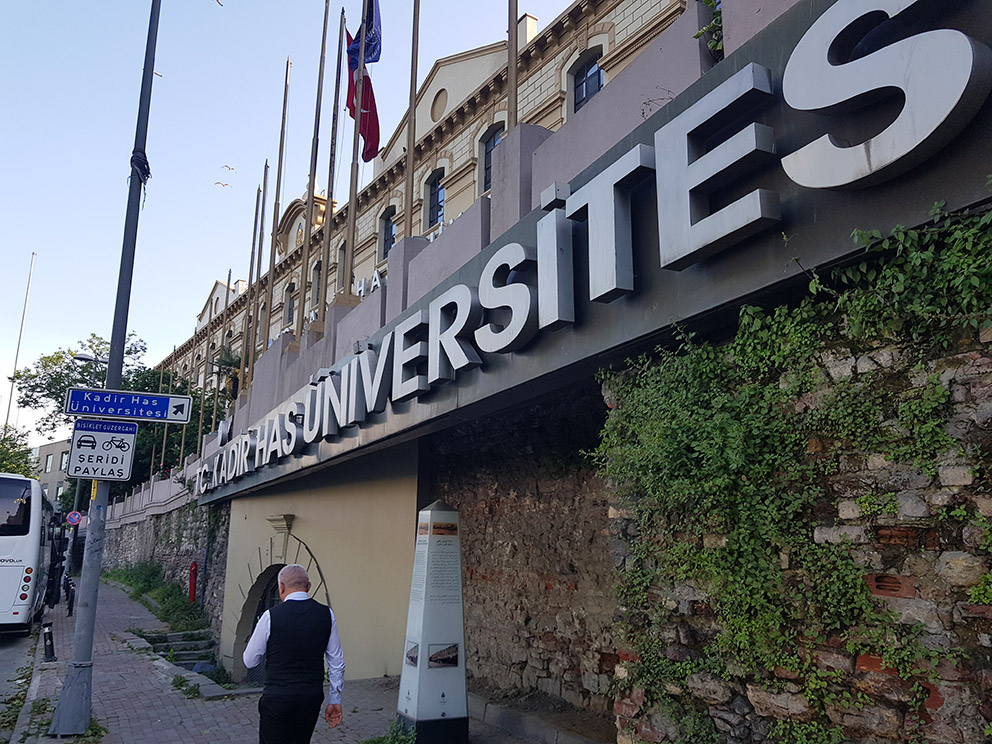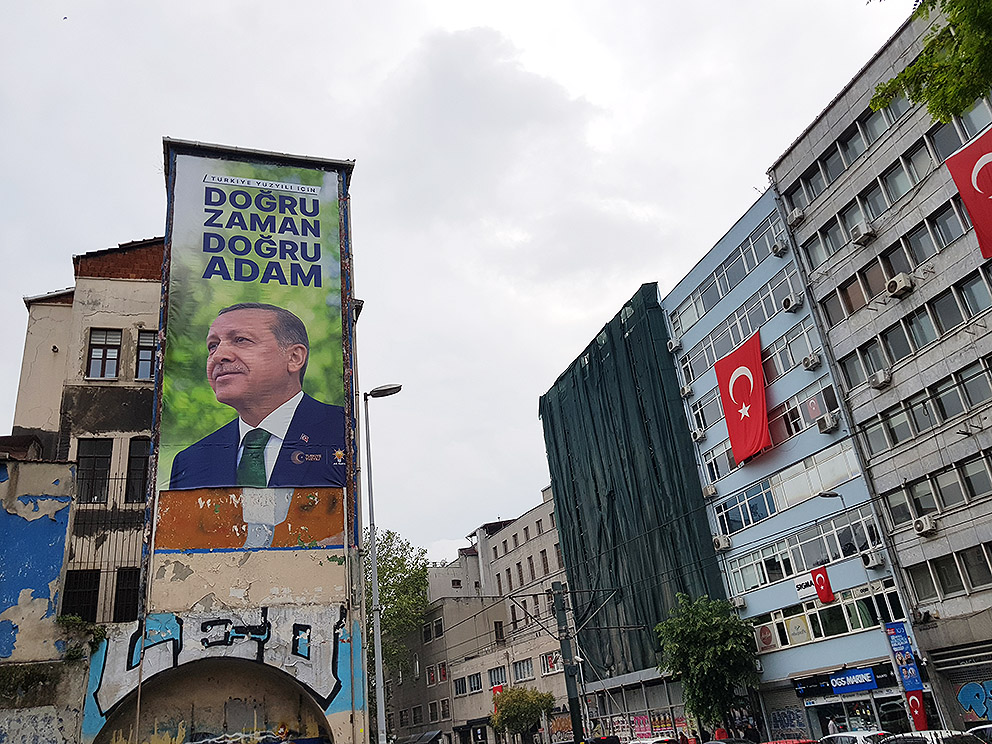Istanbul, Kadir Has University (photo (F. Brusa)
Some academics, who had lost their jobs due to the “purges” initiated during the state of emergency introduced in the country with the 2016 coup attempt, have recently been able to return to university. The atmosphere in Türkiye in anticipation of the presidential ballot
Not all injustices are forever. While Turkey’s political future is still uncertain, with the presidential runoff taking place this Sunday between outgoing President Erdoğan and Republican challenger Kılıçdaroğlu, there are those who seem to have already achieved a small “victory”: some academics, who had lost their jobs due to the “purges” initiated during the state of emergency introduced in the country following the 2016 coup attempt, they were recently able to return to university and thus emerge from a condition of “civil death” that had been imposed on them from state repression.
“In Turkey, if you are an intellectual with a public profile you automatically become a social problem,” says constitutional law professor Dinçer Demirkent – who was readmitted to Ankara University last March after almost five years of suspension. «In general, you are allowed to do research freely, even on sensitive topics such as the Kurdish question or LGBT rights. But if you speak out and fight for your rights, the government will be angry with you.”
Emergency layoffs
The two-year period of 2015-16 undoubtedly constitutes a watershed in the history of modern Turkey, and not only for the attempted coup d’état for which the AK-led government accused Fethullah Gülen’s religious organization (“renamed” as a terrorist acronym with the nickname of “Fetö”). The convulsive and bloody hours of “July 15” were in fact preceded by an equally violent and confused period, with numerous attacks in some of the major cities of the country, the definitive closure of the negotiation process started between the state and the armed guerrillas of the PKK and the resumption of a “hot” conflict in the eastern regions with a Kurdish majority.
It is on this occasion that about two thousand academics signed a “Call for peace”, which asked precisely to address the tension in Kurdistan through dialogue and not with the use of force.
About a year later at least four hundred of them lost their jobs, as well as suffering the withdrawal of their passports and disqualification from holding public offices. “We have had all civil, political and constitutional rights cancelled,” continues Dinçer Demirkent. «The coup attempt was used by Erdoğan to accuse every opponent. Universities have been essentially silenced.”
Not only the universities: with the introduction of the state of emergency in the country (which lasted until 2018), there have been 150 thousand dismissals and removals from positions between military and public officials (approximately 10% of the approximately two million employed in the public sector), 80,000 people arrested and detained, over 8,000 of whom were subsequently imprisoned, as well as the closure of numerous schools, education centres, communication channels, etc.
A process that has profoundly affected Turkish society and political life, effectively marking the beginning of a new phase of power for the AKP that is increasingly similar to the “dictatorship of one man” (an evolution sealed by the transformation of the form of government in a presidential republic with the referendum del 2017).
“In our country there are a hundred law faculties, but there hasn’t been one that in recent years has organized a conference or debate on the state of emergency and its implications for the legal system,” notes Demirkent. “This gives you a measure of how narrow the spaces for freedom of expression are and how strong self-censorship is.”
The fact is that it is not easy to react to a state dismissal with all the stigma that, in addition to the economic and social difficulties, such a thing brings with it. While some people have not stopped fighting or hoping for change, others have simply fled the country. Still others could not stand the psychological pressure and the changed living conditions and committed suicide: the latest in chronological order was the academician of the University of Samsun Fehmiye Çelenk, a forty-four year old mother of three children, who last March she was hanged at her home. “After the cruel dismissal that she suffered, she has not been able to face the vortex of depression,” she said – giving notice on their social channels – the representative of Yesil Sol Parti Ömer Faruk Gergerlioğlu (one of the few political figures who in recent years has engaged in solidarity with the victims of the “purges”).
From 2016 to today, this is the seventy-eighth person who, following the loss of a job (his or a family member) due to presidential decrees, has chosen to end his life. Among other things, one reveals it publication edited and disseminated independently by Rafet Irmak and Aziz Yıldırım, who were also fired during the state of emergency, which collects all cases of this type.
“With the disqualification from public offices, you are forced to look for a job in the private sector where, however, there are many obstacles and prejudices against you”, confirms Demirkent. “Even now that I’m back in college, I’m the subject of mobbing and I have not yet been able to resume the actual teaching». To this, it should not be forgotten, there are also deaths and suicides in prison, of which there are dozens every year and the fate of which it is legitimate to assume is also affected by the sharp increase in the prison population (from 2011 to 2021, occurred an increase of 89%).
The importance of solidarity
Therefore collective solidarity and the joining of forces becomes fundamental. Dinçer Demirkent, for example, has been able to count on the support of a university union which also offers financial aid to those who are made redundant. Furthermore, in the period in which he was removed from his profession, he and other teachers engaged in the project of the “Schools of Human Rights” which intends to investigate the repercussions of the state of emergency and government authoritarianism in the field of research and academic freedom.
“My case still hangs by a thread,” he concludes, explaining how he managed to get his job back only after numerous appeals in various judicial offices and how the legal process has not yet come to an end. In addition, the result of the elections will also weigh on the future: «If Erdoğan were to win, I clearly expect the repression to intensify, especially as regards support structures such as the trade unions, while with Kılıçdaroğlu it is likely that we will get more tools to enforce our rights. But, beyond the ballot, one of the most right-wing parliaments in recent years has already been elected. In any case, therefore, our battle continues ».
Have you thought about a subscription to OBC Transeuropa? You will support our work and receive preview articles and more content. Subscribers to OBCT!


